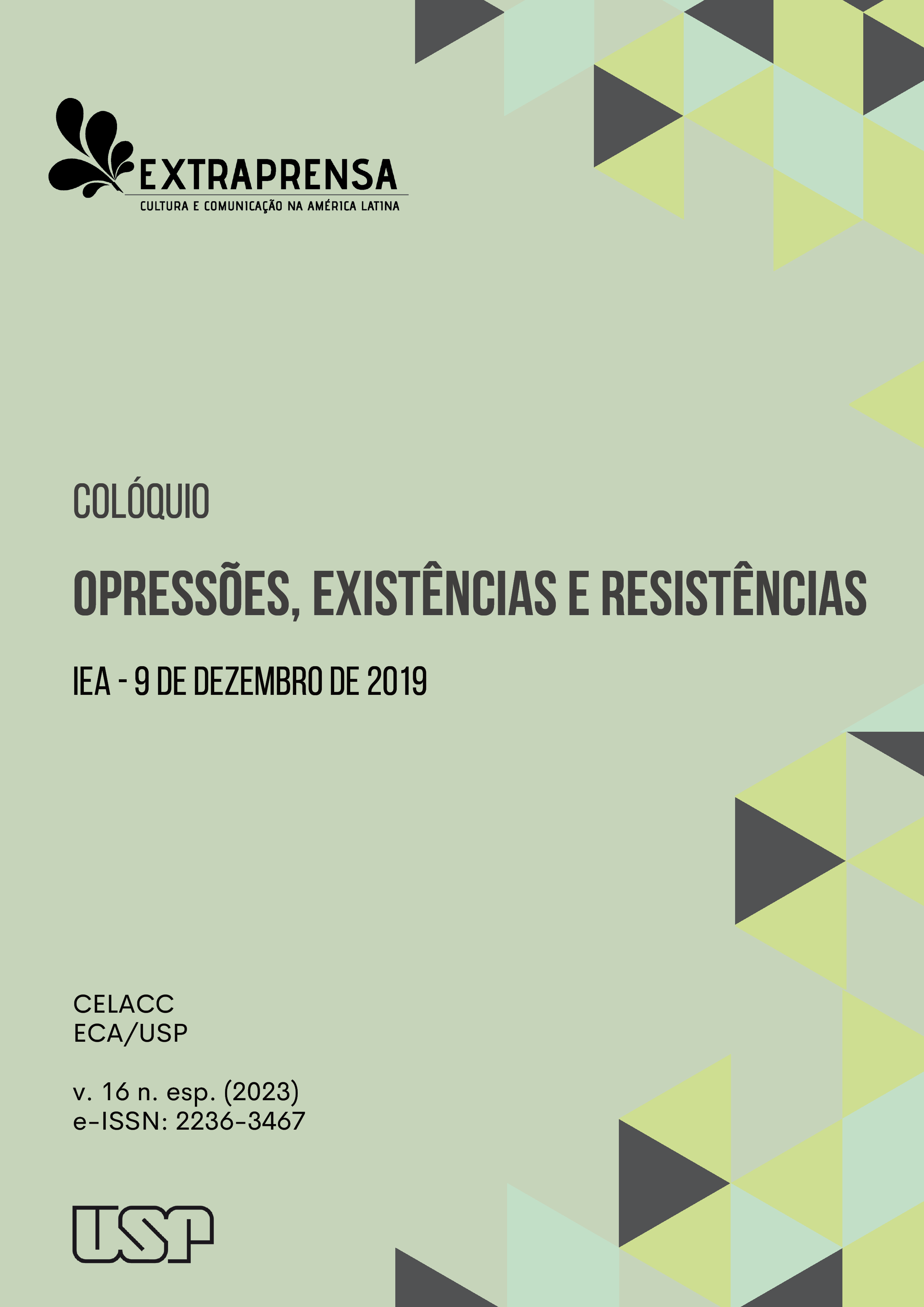Percursos na luta de coletivos culturais das periferias de São Paulo
DOI:
https://doi.org/10.11606/extraprensa2023.220376Keywords:
Necropolitics, Quilombagem, Colonialism, Coloniality of powerAbstract
The main denunciation flag of the Brazilian black movement since the end of the 1970s is the genocide of black youth. It has been current and is gaining evidence with new forms of action and due to advances in social policies in democratic regimes, mainly since the 1990s and the paradigmatic changes in the capitalist mode of production. The most recent process of democratization in the country, achieving the citizen constitution from 1988, is marked by contradictions, the advance of neoliberalism, threats to Brazilian democracy, and the increase in violence rates, in which the young black man from the periphery becomes the “enemy of the State.” Using Quijano’s (2005) concept of Coloniality of power and the concept of Necropolitics, defended by Mbembe (2012), we seek to understand the political praxis of cultural collectives from the outskirts of the municipality of São Paulo that, by putting tension on State structures based on sociability alternatives, propose a new meaning to the public sphere. To understand black protagonism in the historical-social formation of Brazil, it is necessary to enter the slave mode of production, where the racial issue occurs with colonialism and class conflicts between slaves and masters. Moura (2001) calls “quilombagem” the strategies of denial of the slavery system by the enslaved. Today, this practice is updated with peripheral collectives.
Downloads
References
ALMEIDA, Silvio Luiz de. Racismo estrutural. São Paulo: Jandaíra, 2019.
BORGES, Tiago. Mesmo com pandemia, assassinatos voltam a crescer no Brasil. Periferia em Movimento, 26 jul. 2021. Disponível em: http://periferiaemmovimento.com.br/genocidiobrasil/. Acesso em: 30 jul. 2021.
CAMPOS, Ana Cristina. IBGE estima que desempregados no Brasil sejam 14,4 milhões. Agência Brasil, 30 abr. 2021. Disponível em: https://agenciabrasil.ebc.com.br/economia/noticia/2021-04/ibge-estima-que-desempregados-no-brasil-sao-144-milhoes. Acesso em: 21 jul 2021.
D’ANDREA, Tiaraju Pablo. A formação dos sujeitos periféricos: cultura e política na periferia de São Paulo. 2013. Tese (Doutorado em Sociologia) – Faculdade de Filosofia, Letras e Ciências Humanas, Universidade de São Paulo, São Paulo, 2013. Disponível em: https://acesse.dev/wTcuz. Acesso em: 21 jul. 2021.
FAUSTINO, Deivison Mendes. Frantz Fanon: um revolucionário, particularmente negro. São Paulo: Ciclo Contínuo, 2018. 144 p.
GARCÍA CANCLINI, Nestor. Culturas transnacionales y culturas populares. Lima: IPAL, 1988.
GONZALEZ, Lélia. A juventude negra brasileira e a questão do desemprego. In: Annual Meeting of the African Heritage Studies Association. Pittsburgh, 26-29 abr. 1979. Mimeografado.
HALL, Stuart. A identidade cultural na pós-modernidade. São Paulo: L&PM, 2011.
MOURA, Clóvis. Dialética radical do Brasil negro. São Paulo: Editora Anita, 1994.
MOURA, Clóvis. A quilombagem como expressão de protesto radical. 2001 Disponível em: https://l1nq.com/tHA4G. Acesso em: 11 de jul 2021.
MOURA, Clóvis. O Negro: de bom escravo a mau cidadão. 2 ed. São Paulo: Editora Dandara, 2021.
MBEMBE, Achille. Necropolítica. Arte & Ensaio, Rio de Janeiro, n. 32, dezembro, 2016. Disponível em: https://encr.pw/CIL3d. Acesso em: 21 jul. 2021.
MBEMBE, Achille. Crítica da razão negra. Lisboa: Antígona, 2014.
MILLS, Charles W. O contrato de dominação. Meritum, Belo Horizonte, v. 8, n. 2, p. 15-70, 2013. Disponível em: https://l1nq.com/WasMP. Acesso em: 30 jul. 2021.
OLIVEIRA, Dennis. Racismo estrutural: Apontamentos para uma discussão conceitual. Minga Informativa, [S. l.], 2001. Disponível em: https://acesse.dev/HrLIC. Acesso em: 31 jul. 2021.
OLIVEIRA, Dennis. Ação direta do capital: o poder do capitalismo contemporâneo. Revista Psicologia Política, São Paulo, v. 15, n. 33, 2015. Disponível em: https://acesse.dev/az7GB. Acesso em 22 jul. 2021.
OLIVEIRA, Dennis. Movimentos sociais, cultura, comunicação e território na América Latina: estudos de experiências de São Paulo, Bogotá e Buenos Aires. 2016. Relatório final (FAPESP) – Escola de Comunicação e Artes, Universidade de São Paulo, São Paulo, 2018.
OLIVEIRA, Dennis. Racismo estrutural. Uma perspectiva histórico-crítica. 1 ed. São Paulo: Dandara, 2021.
QUIJANO, Anibal. Colonialidade do poder, eurocentrismo e América Latina. In: LANDER, Edgardo (org.). A colonialidade do saber: eurocentrismo e ciências sociais – Perspectivas latinoamericanas. Buenos Aires: CLACSO, 2005. p. 117-142.
RECORDE: 14,5 milhões de famílias brasileiras vivem na extrema pobreza. Portal IG, 23 maio 2021. Disponível em: https://economia.ig.com.br/2021-05-23/recorde-extrema-pobreza-14-5-milhoes-familias-miseria-brasil.html. Acesso em: 21 jul. 2021.
Downloads
Published
Issue
Section
License
Copyright (c) 2023 Tâmara Pacheco

This work is licensed under a Creative Commons Attribution-NonCommercial-NoDerivatives 4.0 International License.
Ao submeter qualquer material científico para Extraprensa, o autor, doravante criador, aceita licenciar seu trabalho dentro das atribuições do Creative Commons, na qual seu trabalho pode ser acessado e citado por outro autor em um eventual trabalho, porém obriga a manutenção de todos os autores que compõem a obra integral, inclusive aqueles que serviram de base para o primeiro.
Toda obra aqui publicada encontra-se titulada sob as seguintes categorias da Licença Creative Commons (by/nc/nd):
- Atribuição (de todos os autores que compõem a obra);
- Uso não comercial em quaisquer hipóteses;
- Proibição de obras derivadas (o trabalho não poderá ser reescrito por terceiros. Apenas textos originais são considerados);
- Distribuição, exibição e cópia ilimitada por qualquer meio, desde que nenhum custo financeiro seja repassado.
Em nenhuma ocasião a licença de Extraprensa poderá ser revertida para outro padrão, exceto uma nova atualização do sistema Creative Commons (a partir da versão 3.0). Em caso de não concordar com esta política de Direito Autoral, o autor não poderá publicar neste espaço o seu trabalho, sob pena de o mesmo ser removido do conteúdo de Extraprensa.







